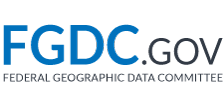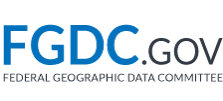Part B
LEAD FEDERAL AGENCY/BUREAU AND/OR SUBCOMMITTEE/WORKING GROUP REPORT (Agencies With Lead Responsibilities Assigned under Current Circular A-16 Authorities) (Please provide a separate report for each activity for which you have the lead)
1. Program/Activity Name:
Federal Geographic Data Committee's Marine Boundary Working Group
2. What are the programs this data supports?
The following agencies participate on the working group.
U.S. Department of Commerce
U.S. Census Bureau
NOAA
U.S. Department of Defense
National Imagery and Mapping Agency
U.S. Navy
U.S. Department of Interior
Bureau of Land Management
Mineral Management Service
National Park Service
U.S. Geological Survey
U.S. Department of State
U.S. Department of Transportation
U.S. Coast Guard
U.S. Environmental Protection Agency
Federal Communications Commission
Very Briefly Describe All Applicable Items:
3. Uses of Data: What are the end uses of this data? How does it benefit customers, support lead and other agency missions, etc.?
The Marine Boundary Working Group (MBWG) will foster integrated approaches to the legal and geospatial descriptions of marine boundaries and mapping of marine boundary features within the territorial water of the United States. Accurate and reliable marine boundary data can be used for regulatory, management, and enforcement applications.
Charter/Plan: Do you have a current charter or plan for collection? Should it be updated?
Yes. A draft charter has been developed.
5. Metadata: What is the status of metadata? Is it discoverable and served through the NSDI Clearinghouse? What percentage of this theme's data has metadata and is in a Clearinghouse node?
6. Standards: What is the status of this theme's data, process, transfer, and classification standards?
7. Progress: List FY 2000/2001 activities/progress to date (quantify where possible)
- Held a kick-off meeting on March 14, 2001 in Silver Spring, MD.
- Developed a draft charter.
- Developed a Marine Boundary Working Group Web site.
- Held a second working group meeting on June 14, 2001.
8. Leadership: Describe your active leadership role with others (private, local, State, Federal) who collect and use this data.
The NOAA Coastal Services Center is the co-chair of the FGDC Marine Boundary Working Group. The MBWG was formed in January 2001 to foster integrated approaches to the legal and geospatial descriptions of marine boundaries and mapping of marine boundary features within the territorial waters of the United States. The goals of the working group are to make maximum use of public resources to avoid duplicating efforts; provide a venue for communicating and coordinating on marine boundary activities; and to use standardized methodologies to produce more complete and usable marine boundary data, metadata, and charts.
9. Collaborative Partnerships: How many major partnerships with others do you have on this theme? (list if desired)
To date, the participating agencies are the Minerals Management Service, National Oceanic and Atmospheric Administration (NOAA), National Park Service, Fish and Wildlife Service, Federal Communications Commission, Bureau of Land Management, the U.S. Census Bureau, and the Environment Protection Agency
10. Scope: Are you engaged in broad participation and international/global coordination?
Currently, several Federal agencies (listed above) participate on the working group. These agencies are responsible for setting, enforcing and negotiating marine boundaries and limits throughout the U.S. and in U.S. sovereign waters. The working group was formed to help coordinate these efforts throughout the Federal government. The working group is not involved in international or global coordination at this point.
11. Policy: Do you have a policy in place for full and open access or data sharing?
Yes. The policy is for full and open access of data in line with OMB Circular A-130. All data is freely available via the FGDC Data Clearinghouse.
12. Are there areas or issues regarding lead responsibilities for spatial data themes that require attention, or lessons-learned that you would like to share with others? Please describe.
None.

